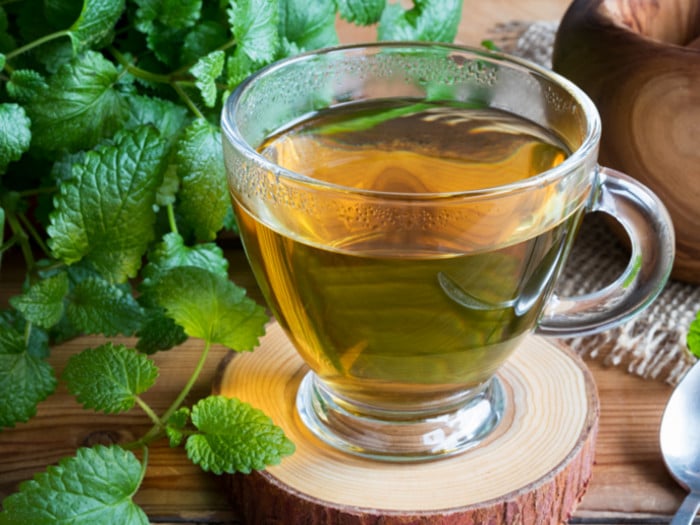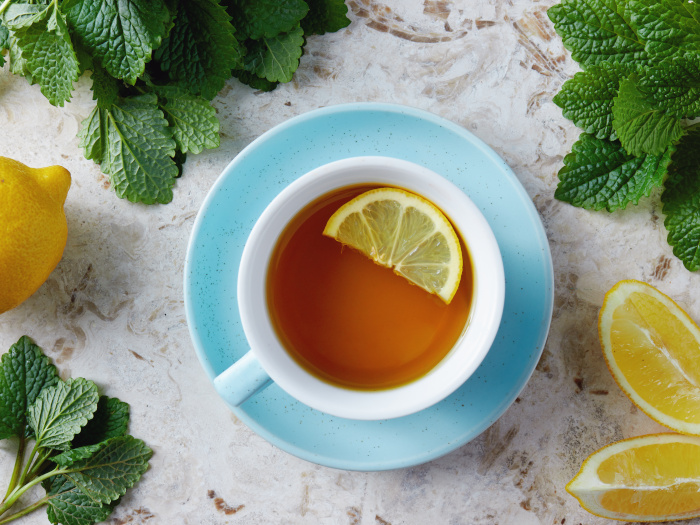Some of the most notable benefits of lemon balm tea include soothing the digestive tracts, treating sleep disorders, stimulating cognitive disorders, boosting the immune system, detoxifying the body, breaking fevers, eliminating anxiety and soothing menstrual symptoms, among others. In terms of side effects, drinking lemon balm tea has rarely been reported to have negative effects, although occasional nausea, vomiting, stomach pain, and dizziness can occur. However, severe toxicity of lemon balm tea has never been reported.
What is Lemon Balm Tea?
This healthy tea is derived from the leaves of the lemon balm plant, scientifically known as Melissa officianalis, [1]which is a member of the mint family. It is widely available and inexpensive, and can also be grown rather easily in a home garden. Praised for its relaxing and sedative qualities, lemon balm tea has been a part of traditional healing practices for centuries. The wide range of health benefits is largely the result of the active compounds found in lemon balm, including tannins, flavonoids, rosmarinic acid, citronellal, eugenol, and other polyphenolic compounds, as well as copper, manganese, zinc and various essential vitamins.
Benefits of Lemon Balm Tea
You should drink lemon balm tea if you suffer from anxiety, insomnia, cold, cough, flu, respiratory infection, fever, painful menstrual cramps, herpes, bloating, flatulence, headaches, high blood pressure, and insect bites.
Anxiolytic Properties
One of the most popular and common uses of lemon balm tea is for people suffering from anxiety. Excess stress hormones in the body can result in several problems, including higher levels of oxidative stress, the strain on the metabolism, and poor heart health. The calming properties of the antioxidants and volatile compounds in this tea can have a nervine effect and reduce symptoms of anxiety, and stress. [2]

Lemon balm tea is taken to treat colds, insomnia, and lower blood pressure. Photo Credit: Shutterstock
Inflammation
Inflammatory conditions come in many varieties, ranging from arthritis and joint disorders to indigestion, allergic reactions, and headaches. Lemon balm has several proven anti-inflammatory compounds that can quickly reduce or eliminate these conditions when used regularly. [3]
Gastrointestinal Distress
Soothing the stomach is another popular use of lemon balm tea, so if you regularly suffer from indigestion, excess flatulence, constipation, acid reflux disease, cramping or bloating, having a relaxing cup of this tea every day can optimize your digestion and ensure proper nutrient uptake. [4]
Immune System
There are antibacterial and antiseptic properties of this tea that make it an effective weapon against a variety of cold, flu, and infections. Aside from the antioxidant effects, this tea can also help promote the production of white blood cells and eliminate mucus and phlegm, which is where many pathogens like to hide and thrive. [5]
Menstrual Cramps
This tea is one of the oldest and most trusted remedies for painful menstrual cramps. The sedative and analgesic properties, combined with some anti-spasmodic effects, can soothe the discomfort of painful periods, and also relieve the anxiety or mood fluctuations that often accompany menstruation. [6]
Cognitive Boost
Lemon balm tea can help to improve cognitive function and sharpen memory. Although lemon balm is commonly used as an aromatherapy tool, drinking the tea also delivers the beneficial antioxidants that can prevent plaque deposition in the neural pathways.
Herpes
Numerous studies have linked the flavonoids and phenolic compounds in lemon balm tea to a reduction in the herpes simplex virus. Lemon balm can be topically applied, but the immune system boost gained from the tea can also help clear up this sexually transmitted disease. [7]
Heart Health
The sedative nature of this herbal tea also helps to suppress blood pressure, making it an ideal relaxing brew for people who suffer from hypertension. If you are already taking blood pressure medication, be sure to speak to your doctor before adding lemon balm tea to your diet, as there could be negative interactions. [8]
How Do You Make Lemon Balm Tea?
You can make lemon balm tea at home with this very simple recipe, provided you have fresh or dried lemon balm, water, and some honey or sugar to add sweetness. If you grow lemon balm at home and wish to dry a larger amount for future use, simply cut the stems from the lemon balm plant and gather them in bunches. Tie them at the base and hang them upside down in a cool, dark and dry place. After 1-2 weeks, the herbs should be fully dried and you can easily separate them from the stems. Place the leaves in a bag and crumble them, separating any stem parts that remain. Store that bag in a cool, dark place until you are ready to use them. If making tea with fresh leaves, you can leave them whole or cut them to release more of the beneficial oils.

Uplifting Lemon Balm Tea Recipe
Ingredients
- 2 tsp fresh lemon balm leaves or
- 1 tsp dried lemon balm leaves
- 2 cups water filtered
- 1 tsp honey or sugar optional
Instructions
- Bring the water up to a boil in a small pot.
- Place the lemon balm leaves in a mug and pour boiling water over them.
- Allow the tea to steep for 5-10 minutes, depending on your desired strength.
- Add sugar or honey, if desired, and then enjoy!

Lemon Balm Tea Side Effects
Side effects of drinking this herbal tea are very rare, and research has also been notably limited on the effects of this herb when used for extended periods. First and foremost, if you are allergic to other plants in the mint family, Lamiaceae, the use of lemon balm may not be wise, as the allergic reaction can be severe.
- Stomach Upset – Although this is rare, one of the most common side effects of drinking lemon balm tea is stomach upset, nausea, and possibly vomiting. This is often experienced by people who consume an excessive amount; the potent active compounds are very beneficial, but only in moderation.
- Dizziness – Some people have reported dizziness or excessive drowsiness when consuming very strong lemon balm tea. Discontinue the use of the tea immediately if you experience these side effects.
- Surgery – Due to the sedative nature of lemon balm tea, it should not be drunk before undergoing surgery, as it can interact negatively with the anesthesia.
- Pregnancy – There is no firm research on the use of this tea during pregnancy or breast-feeding, so it is not recommended for pregnant women.
- Children – Although most herbal teas are recommended only for adults, lemon balm tea has been approved for use in children in small doses, and for limited times.

